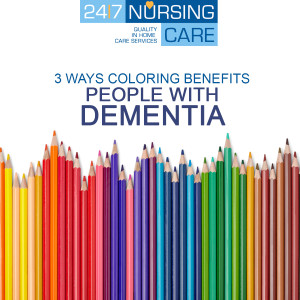3 Ways Coloring Benefits People with Dementia
Coloring is a fond childhood memory for many, but did you know that it is also an enjoyable hobby with many benefits for adults, particularly people with Dementia? Although adult coloring has been around since 2005, it has recently exploded in popularity so much so that several adult coloring books have made their way to bestseller’s lists worldwide. But what is it that makes them so popular? Of course, coloring is a fun way to use up free time, but it seems that pop culture has tapped into something much bigger, and that is the therapeutic benefits of coloring. Although coloring as therapy for people with Dementia has yet to be validated by hard research, plenty of Alzheimer’s caregivers have testified to its therapeutic benefits. We’ve compiled a list of the top three therapeutic benefits of coloring for people with Dementia.

1. It’s relaxing and helps to manage stress.
Everyone from researchers at Johns Hopkins University to the editors of Yoga Journal suggest coloring as an alternative to meditation, a practice which promotes relaxation and mindfulness. In an article that appeared in Medical Daily, Marygrace Berberian, a certified art therapist and the Clinical Assistant Professor for the Graduate Art Therapy Program at NYU testified to the relaxing effect coloring has on people. “Coloring definitely has therapeutic potential to reduce anxiety, create focus or bring [about] more mindfulness.”
In one 2005 study, anxiety levels dropped when subjects colored mandalas, round frames with geometric patterns. Interestingly, simply doodling had no effect on reducing study participants’ stress levels. In the Herald Tribune Article, “Dementia therapy inside the lines, outside the box”, Bob Minton, Resident Program Director of Heron East assisted living center, speaks to the positive effects coloring has on adults with Dementia. In fact, he has implemented coloring in his facility as an organized activity. He spoke eloquently of the positive impact of coloring on people with Dementia, “In Alzheimer’s disease and other dementias, words are not available…but emotions and colors and music are still available to the person who is affected. When emotions have been evoked, the person functions much better. I would encourage anything that improves the mood and engages them.”
2. It gives the person a sense of accomplishment and helps them keep their dignity.
Minton also noticed those that pick up coloring as a hobby tends to be mostly women. If someone was interested in art in their younger years, they would typically be interested in coloring later on in life. He noted that some people didn’t want to participate, and that is fine. It’s important to give people the choice to opt in or opt out.
Cameron J. Camp, director of research and development at the Center for Applied Research in Dementia in Solon, Ohio, notes that it’s vital for people with cognitive loss to maintain a connection with their earlier lives. It shouldn’t be taken away from someone once he/she receives a diagnosis either. Individuals with Dementia feel a sense of accomplishment when they are enabled to regain that connection. The trick, he says, is to modify the activity so the person is able to tap into their skills and expertise, and accomplish those things.
Camp recently held workshop on a program he had created to help people “live well” throughout all stages of Dementia. He believes that the subject matter of a coloring book can be crucial in maintaining a person’s dignity. Keep this in mind when choosing a coloring book, and make sure it’s specifically designed for adults, with subject matter that appeals specifically to the individual.
3. It allows them to “do their own thing”.
It’s not as much about the end result as it is about the process. This is especially true when it comes to coloring for people with Dementia. “It relaxes you even if you’re not really coloring within the lines, but you’re trying to,” Minton observes. “About 10 to 15 minutes into it, it kind of puts you in a meditative state. It’s not so much about staying in the lines; it’s about doing your thing. That picture becomes very unique to you. It’s all about getting out of the drawing the benefit of relaxing.”
24/7 Nursing Care, Inc. leads the way in nursing care and companion services for individuals with Alzheimer’s and other Dementias who want to keep their independence and remain in their homes. Our exceptional care providers, specialized in psychiatric nursing care will come to you instead. These skilled nurses provide medication management, in addition to basic nursing care, and are trained to deal with the unique circumstances of altered mental consciousness. Feel free to call us at 786-497-7068 24 hours a day, 7 days a week, and we will be happy to assist you.
References:
Smith, B. P. (2016, April 10). Dementia therapy inside the lines, outside the box. Retrieved April 11, 2016, from http://www.heraldtribune.com/article/20160410/ARTICLE/160409622/2416/NEWS?Title=Dementia-therapy-inside-the-lines-outside-the-box&tc=ar
Dovey, D. (2015, October 08). The Therapeutic Science Of Adult Coloring Books. Retrieved April 12, 2016, from http://www.medicaldaily.com/therapeutic-science-adult-coloring-books-how-childhood-pastime-helps-adults-356280



